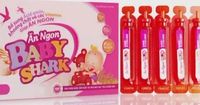On April 25, 2025, the Investigation Security Office of the Ministry of Public Security revealed an alarming case involving the production of counterfeit health foods aimed at children. Herbitech Company Limited, based in Phu Lo commune, Soc Son district, Hanoi, has come under scrutiny for allegedly using fake test result slips to market its products. The investigation has identified two specific counterfeit products: BABY SHARK and Medi Kid Calcium K2, both marketed as health supplements for children.
Initially founded in May 2003 as Intechpharm Technology Company, Herbitech has seen a dramatic increase in its charter capital, rising from 2.2 billion VND to an astonishing 40 billion VND. This surge has raised suspicions about the company's operations, particularly regarding its claims of importing high-quality ingredients from countries like France, Germany, and the United States.
According to the National Business Registration Information Portal, the company was originally represented by Mr. Ha Minh Toan, who contributed 40% of the initial capital. Over the years, ownership has shifted, with Mr. Pham Vu Khiem becoming the director and legal representative by December 2017. Under his leadership, the company has expanded its product line to over 200 items, allegedly worth hundreds of billions of VND.
However, the quality control measures at Herbitech have been called into question. Reports indicate that the company has been producing products that do not meet the declared standards. For instance, Mr. Khiem has reportedly admitted to altering product test results, changing labels from "does not meet" to "meets" to facilitate market entry.
Lieutenant Nguyen Van Thanh, an officer from the Investigation Security Agency, highlighted the tactics used by counterfeiters. They allegedly produce products in bulk based on customer demands, sending samples for testing to ensure compliance with declared ingredients and quantities. If the results do not match, they coordinate with testing companies to adjust the findings, or even fabricate test result slips.
This incident is part of a broader issue, as it coincides with an ongoing investigation into a large-scale counterfeit milk powder operation. This network, which has been active since August 2021, has produced 573 brands of milk powder for vulnerable groups, including pregnant women, infants, and those with health issues. Ingredients claimed on the packaging, such as bird's nest extract and cordyceps, were found to be entirely absent from the products.
The Ministry of Public Security has taken significant steps to dismantle these operations, emphasizing the importance of protecting public health and safety. The counterfeit products not only undermine consumer trust but also pose serious health risks, particularly for children who are more vulnerable to substandard nutrition.
As the investigation unfolds, authorities are focused on ensuring accountability within the food production industry. This case serves as a stark reminder of the potential dangers associated with counterfeit health products and the need for stringent regulatory measures to protect consumers.
In light of these revelations, parents and caregivers are urged to be vigilant when selecting health supplements for children. The importance of verifying product authenticity and quality cannot be overstated, especially in a market where counterfeit goods are increasingly prevalent.
This investigation highlights the critical role of government oversight in ensuring that health products meet safety standards. The Ministry of Public Security's proactive approach aims to curb the spread of counterfeit goods and restore confidence in the health food market.
With the public's health at stake, it remains imperative for consumers to stay informed and cautious. As more details emerge from this investigation, the focus will undoubtedly shift towards implementing stronger regulations and enhancing quality control measures across the industry.

